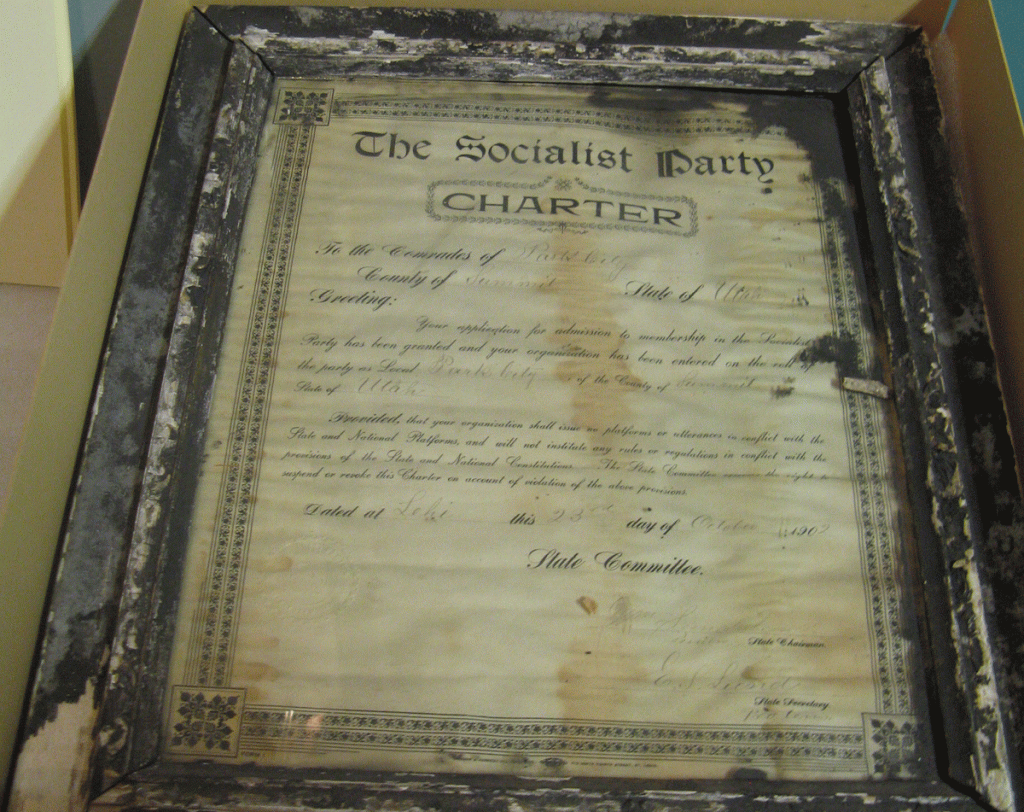In the 20th century, unionized Park City miners sometimes became involved with radical left-wing politics, much to the chagrin of mine owners and local officials. Hundreds attended meetings held by the socialist-oriented Industrial Workers of the World (commonly called the Wobblies) in the late 1910s and early 1920s. The Wobblies organized several miners’ strikes (demanding a $6 minimum wage, eight-hour workdays, and stricter safety standards), though they were treated with hostility by other miners, local authorities, and the Park Record, the latter of which called Wobblies “outside agitators” with “freak propositions.” Aware of miners’ political potential, a new organization arrived in Park City at the turn of the century, with the intention of coordinating miners and other workers into a cohesive political bloc: the Socialist Party of America (SPA).
After being founded the year before, the SPA first fielded a slate of candidates for local office in Park City and Summit County in 1902. Active throughout Utah, the SPA opposed both the Republican and Democratic Parties—which the SPA’s Utah branch called the “two wings of the capitalist party”—and invited miners, railroad workers, and “all interested in improving the condition of the working class, materially, morally and spiritually” to join their organization. The Socialists based in the state demanded public ownership of utilities, single-payer healthcare, and “a law providing for mine inspectors, to be selected…from the ranks of practiced miners.” Although this was simply the Utah branch of a national political party, its leaders nonetheless tailored their platform to reflect the needs of Utah miners, in particular.

Credit: Park City Historical Society & Museum, Dale Nelson Collection
When the SPA first appeared in Park City, Socialist Parkites were optimistic about their electoral chances. Local Socialist leaders—especially Charles E. Myers, who arrived in Park City in 1892 and later served as the town’s “water master”—were popular in the community, and their meetings were well-attended, especially by miners. Socialists felt hopeful during many of the electoral campaigns of the 1910s, and in 1907 the Park Record assessed that the Socialists were the party to beat in that year’s election. The paper, which would later express such harsh views about the Wobblies, seemed receptive to the SPA, at first: it called the SPA speaker V. R. Bobman “a big, honest, broad-minded man…and impresses one as being sincere and worthy of support,” and encouraged Parkites (even those who “may not think as [Socialists] do”) to review the SPA platform.
Although the SPA did see some success elsewhere in the country, and even in Utah, they struggled in Park City. Socialist candidates usually placed third in local elections, behind their Democratic and Republican opponents. Though a dedicated Summit County Socialist Party was formed in 1914, their popularity and influence was already beginning to wane. The Park Record turned firmly against the SPA, especially after the party publicly opposed American involvement in World War I. The Record raged that “during the war [the Socialists] did what they could to overthrow the American government,” because the SPA opposed conscription and defended those who attempted to avoid the draft. In 1922, the paper called local Democratic organizer Jerry Linehan “justly indignant” after he was erroneously addressed as the secretary of the Summit County Socialist Party, seemingly endorsing Linehan’s threat to give whoever identified him as a member of the SPA “the beating of his life.”
By the mid-1930s, the SPA was no longer nominating candidates for local office in Park City. Though they had achieved little success in Park City, Socialists nonetheless played an important role in Park City history. The SPA campaigned for the rights of miners, both in Park City and throughout the rest of Utah, and encouraged economically marginalized Utahans to become involved with local and state politics. Even decades later, some Parkites remembered the Socialists and their ideas fondly: in 1976, the Park Record retroactively conceded that the SPA nominee for mayor in 1920, David Baxter, had “a wealth of egalitarian ideas, and in all probability, would have been as fine a mayor as any man could’ve been.”
Sources:
“The ‘Wobblies’ Are Routed,” Park Record, February 20, 1920, 1, https://newspapers.lib.utah.edu/ark:/87278/s62c01c8/7964253; “West Avoids the Wobblies,” Park Record, February 6, 1920, 4, https://newspapers.lib.utah.edu/ark:/87278/s6ws9wmr/7962772.
Park Record, November 1, 1902, 1, https://newspapers.lib.utah.edu/ark:/87278/s6ks7tr5/8337518.
Socialist Column: Read! Reflect!” Park Record, October 13, 1906, 1, https://newspapers.lib.utah.edu/ark:/87278/s6v70mtw/7926284.
Plain Statement of the Position and Aims of Socialist Party in Utah,” Park Record, November 3, 1906, 6, https://newspapers.lib.utah.edu/ark:/87278/s6fx8cr9/7926433.
“A Strong Personality,” Park Record, March 9, 1912, 6, https://newspapers.lib.utah.edu/ark:/87278/s63x98xk/7943567; “Political Ramblings,” Park Record, October 3, 1908, 2, https://newspapers.lib.utah.edu/ark:/87278/s6j39vt1/7932178.
“Socialists Take Lead,” Park Record, October 5, 1907, 1, https://newspapers.lib.utah.edu/ark:/87278/s6md028n/7928876.
“Political Ramblings,” 2; “General Items,” Park Record, October 6, 1906, 2, https://newspapers.lib.utah.edu/ark:/87278/s6zw2p5f/7926254.
“Socialists Organize,” Park Record, January 31, 1914, 1, https://newspapers.lib.utah.edu/ark:/87278/s60v9g3p/7946942.
“Branding the Socialists,” Park Record, April 9, 1920, 4, https://newspapers.lib.utah.edu/ark:/87278/s6s194tt/7962848.
“Jerry Linehan Still True-Blue Democrat,” Park Record, April 14, 1922, 7, https://newspapers.lib.utah.edu/ark:/87278/s66m494m/7970964.
“Old Timer’s Tales,” Park Record, November 18, 1976, 18, https://newspapers.lib.utah.edu/ark:/87278/s6698674/8203689.